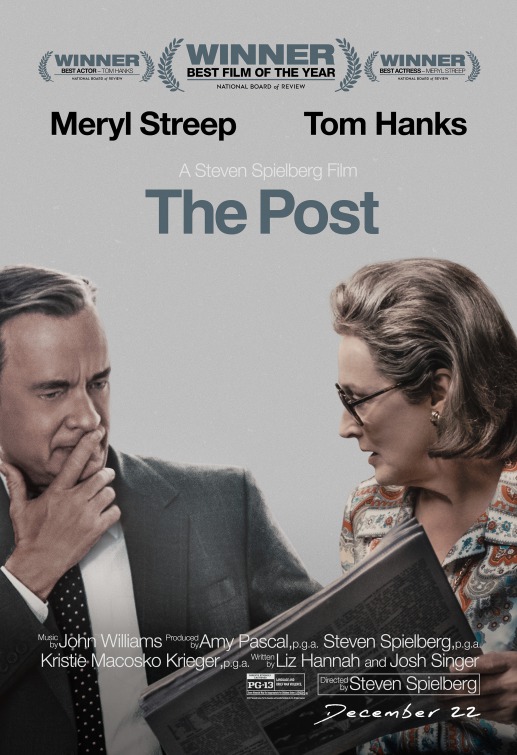
![]() It’s certainly a tribute to the talent involved that the saga of an entity that “came in second” has been fashioned into a fairly absorbing drama about freedom of the press. The chronicle details a newspaper and their efforts to publish The Pentagon Papers. The New York Times was there first. They are the ones that broke the story initially, but then they were restrained by an injunction from continuing to do so. Their hands were tied, unable to divulge anything more without reprisal. The Washington Post stepped in and picked up the pieces.
It’s certainly a tribute to the talent involved that the saga of an entity that “came in second” has been fashioned into a fairly absorbing drama about freedom of the press. The chronicle details a newspaper and their efforts to publish The Pentagon Papers. The New York Times was there first. They are the ones that broke the story initially, but then they were restrained by an injunction from continuing to do so. Their hands were tied, unable to divulge anything more without reprisal. The Washington Post stepped in and picked up the pieces.
The Pentagon Papers were a top-secret study regarding United States’ military involvement in Vietnam from 1945 to 1967. In a nutshell, the research determined that the Vietnam War was unwinnable by the U.S. I’ll admit, that’s really simplifying things. The report comprised 47 volumes with approximately 7,000 pages of historical analysis and original government documents. Yet that itself was not the pivotal truth, but rather that Lyndon B. Johnson had actually lied to the American public about our ability to succeed in the war. In the recent Darkest Hour, Winston Churchill is depicted as doing the very same thing. Interestingly his actions are portrayed in a far more positive light. In The Post, however, the Pentagon Papers ultimately undermine both the Johnson administration and subsequently Richard Nixon’s as well. His crime was that he allowed things to progress without revealing the lie promoted by the earlier regime. Nixon is featured in a scathing scene at the very end. It’s hardly subtle, although most of the film is considerably more nuanced.
The Post was actually hastily assembled by director Steven Spielberg during some downtime while making his upcoming sci-fi epic Ready Player One. The production feels like a timely response to the current administration and their antagonistic relationship with the press. Tension is constructed around the First Amendment. That makes the representation feel socially relevant and extremely shrewd. The attempt to stifle the press is a key component of this narrative. Curiously, what makes this composition fascinating, isn’t its attack on the presidency and the abuse of power. No, what makes the account compelling is the distinct character of Kay Graham (Meryl Streep). She assumed the role of publisher of her family’s newspaper, the Washington Post following the death of her husband.
As interpreted by the inimitable Meryl Streep, Graham is further exalted as a woman making the biggest decision of her life – risking the reputation of her family’s newspaper on whether to publicize The Pentagon Papers. She’s unquestionably good, but it’s hard not to regard her mannered portrayal – as well as that of Tom Hanks as executive editor Ben Bradlee — as for your consideration bids to win awards. I never forgot that I was watching a talented actor giving a captivating performance. As Bradlee’s wife Tony, Sarah Paulson is a bit more natural. She delivers a particularly juicy monologue late in the game in which she basically schools her husband as to why Kay Graham is worthy of our respect. Strangely, Daniel Ellsberg (Matthew Rhys) the U.S. military analyst who was directly responsible for releasing the Pentagon Papers, has a surprisingly minor part. In the true-life tale, he played a much bigger role.
The Post is a feminist anthem. As the only woman to hold such an exalted position, Kay Graham had difficulty being taken seriously by many of her male colleagues and employees. A scene highlighting her as the only woman in an all-male boardroom is notably effective. It’s apparent she was going to have to assert herself to be heard, It is that focus that makes this production unique. I hate comparing one picture with another. Movies should usually be judged independently of one another on their own merits. Nevertheless, it’s virtually inexcusable to not at least acknowledge the similarly themed Oscar Winner for Best Picture, Spotlight, when discussing this feature. That screenplay focused on reporting the information itself. With The Post, it’s more about the figure of Kay Graham as she risks picking up the pieces of what the New York Times initially started and continues on with it. That notion is less imperative by comparison. There are so many ways you could have approached this account. What the New York Times accomplished, what Daniel Ellsberg released, or how the Supreme Court ruled over these events. The meaningful details of these various plot threads demand far more attention than are given here. Nevertheless, in the hands of director Steven Spielberg and actors as talented as Streep and Hanks, it still becomes a pretty entertaining film.
12-01-17

5 Responses
Fine review Mark!
Thanks! Are you going to see this?
Yep. Within the next few days.
Also reminded of “Spotlight”. That movie was better. This was also good, but I didn’t really care about the subject matter. Meryl was awesome, of course. I give this 3 1/2 stars
It’s good, but not great.